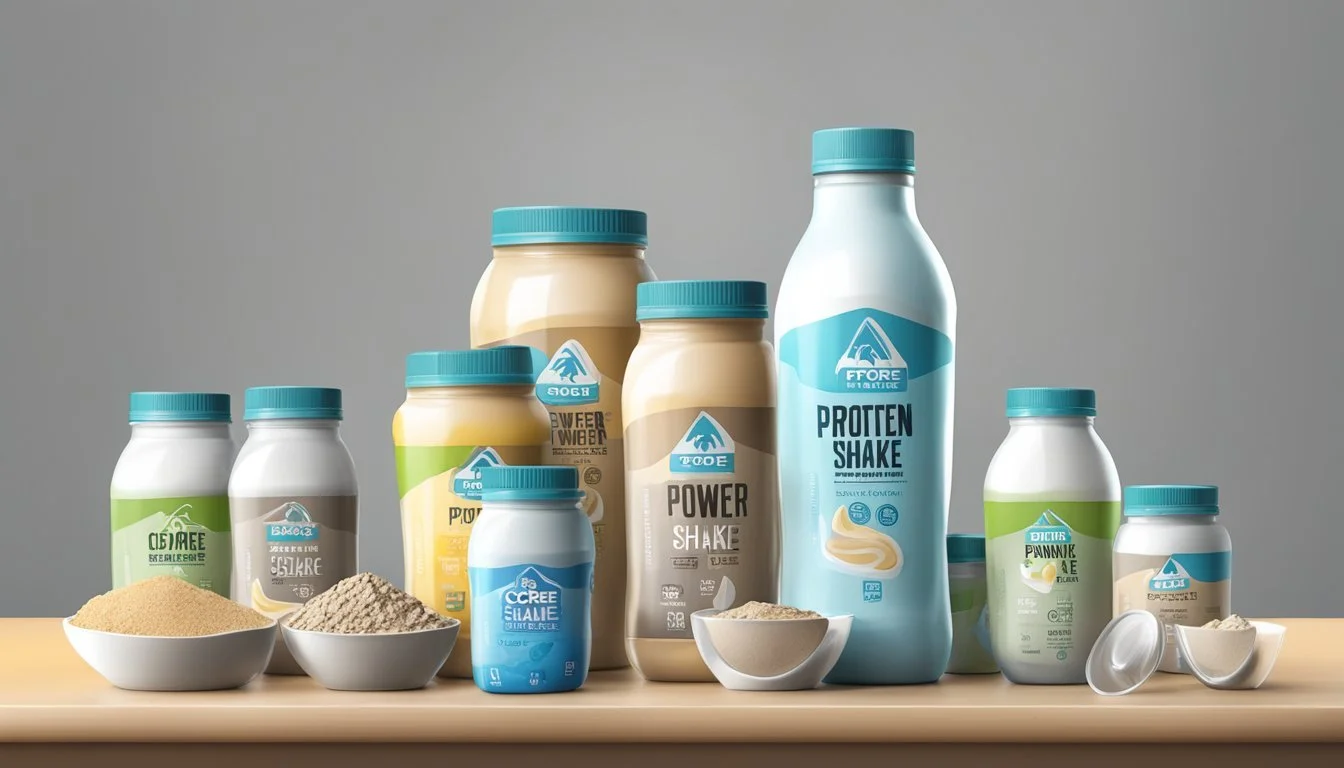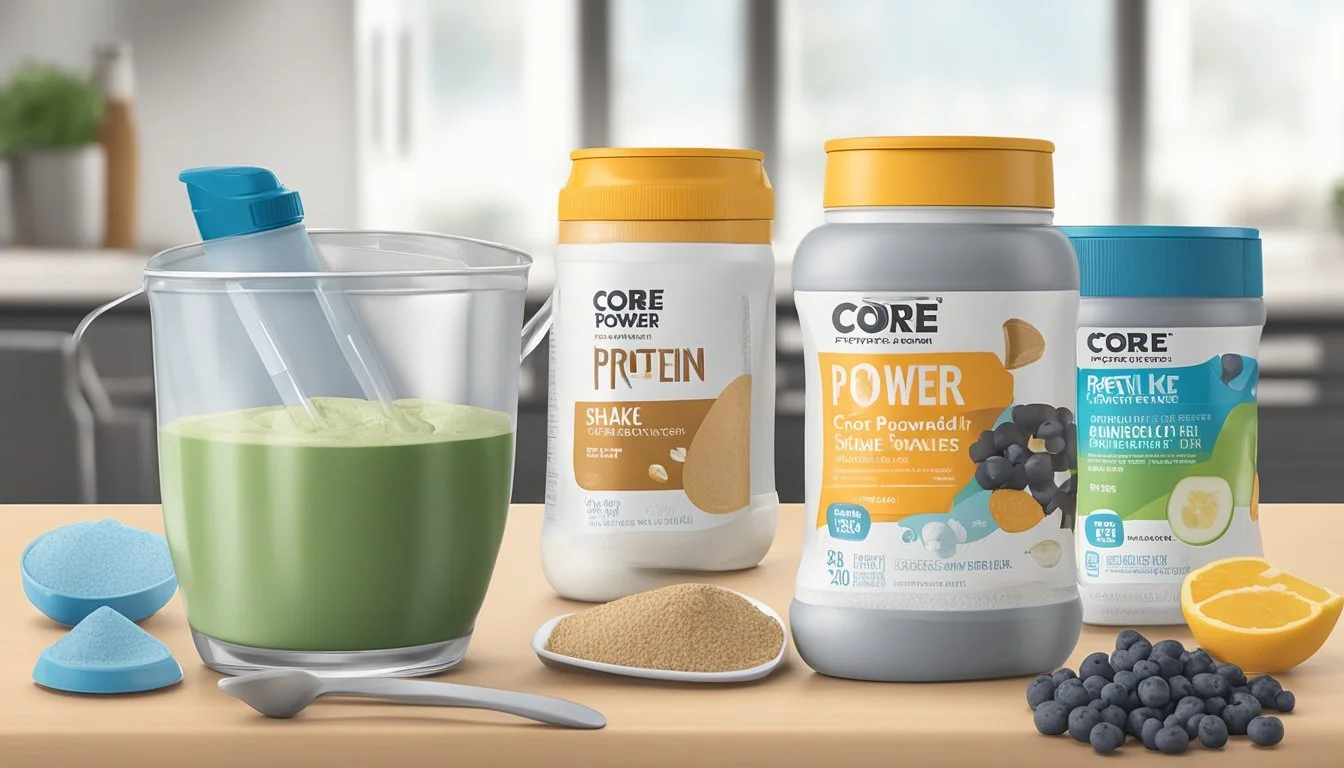How Many Servings of Core Power Protein Shake Is Too Much
A Comprehensive Guide
When considering how many servings of Core Power Protein Shake are too much, it's essential to evaluate one's total protein intake. For most healthy adults, one to two servings a day can be adequate, especially when combined with other protein sources. This aligns with general protein recommendations of 0.8 grams of protein per kilogram of body weight.
Athletes or those on a high-protein diet might require more, up to 1.8 grams per kilogram, depending on their training intensity. Therefore, exceeding three servings per day might lead to unnecessary protein intake, which can strain the kidneys and isn't beneficial for overall health.
Understanding each individual's nutritional needs and health goals is crucial for determining the appropriate number of protein shakes. Sticking to recommended servings ensures balanced nutrition and supports muscle growth, bone health, and immune function without potential adverse effects.
Understanding Protein Needs
Individual protein needs vary and are influenced by several factors. Age, sex, activity level, and overall health play crucial roles in determining how much protein is necessary.
The Recommended Dietary Allowance (RDA) suggests 0.8 grams of protein per kilogram of body weight. For instance, a person weighing 70 kilograms would need around 56 grams of protein daily.
Active individuals, particularly athletes, often require more protein to support muscle recovery and growth. They might consume between 1.2 to 2.0 grams of protein per kilogram of body weight.
Older adults may also need higher protein intake to help maintain muscle mass and prevent sarcopenia. For them, 1.0 to 1.2 grams per kilogram can be beneficial.
Example Protein Needs
Individual Type Protein Needs (grams per kg) General Adult 0.8 Athletes 1.2 - 2.0 Older Adults 1.0 - 1.2
Daily protein intake should come from a mix of natural foods and supplements. While protein shakes are convenient, they shouldn't replace whole foods, which provide other essential nutrients.
Knowing your specific protein needs helps in making informed dietary choices, ensuring you meet your daily requirements effectively and healthily.
Core Power Protein Shake Overview
Core Power Protein Shake is a popular choice among fitness enthusiasts and those needing a quick, nutritious beverage. Produced by Fairlife LLC, a subsidiary of The Coca-Cola Company, this protein shake is made with ultra-filtered low-fat Grade A milk.
Each 14-ounce serving of Core Power Protein Shake contains 26 grams of high-quality protein. This includes essential and branched-chain amino acids, which are crucial for muscle recovery and growth.
Beyond protein, the shake offers several important nutrients. A single bottle provides:
Calories: 170
Total Fat: 4.5g (Saturated Fat: 3g)
Sugars: 5g
Vitamin D: 20mcg (100% DV)
Calcium: 780mg (60% DV)
Potassium: 780mg (17% DV)
Iron: 0mg
The drink is available in three flavors: vanilla, chocolate, and strawberry. This variety ensures that consumers can choose a flavor that suits their taste preferences.
Key ingredients include filtered low-fat Grade A milk and less than 1% of natural flavors and other additives to enhance taste and nutritional value.
The convenience of being ready-to-drink makes it a suitable option for those with busy lifestyles, looking to get a nutritious boost on the go.
With its nutrient profile, Fairlife Core Power Protein Shake is designed to help with muscle recovery post-workout, offering a balanced mix of proteins, vitamins, and minerals to support overall health.
Benefits of Adequate Protein Intake
Adequate protein intake plays a critical role in muscle maintenance, weight management, recovery, and overall health. This section emphasizes the specific benefits tied to these crucial areas, highlighting their impact on daily functions and well-being.
Muscle Maintenance and Growth
Protein is essential for muscle maintenance and growth. It provides the building blocks, or amino acids, necessary for muscle protein synthesis. Regular protein intake, especially after workouts, can help build muscle mass and promote recovery.
For those engaged in strength training or physical activities, higher protein levels can lead to increased muscle hypertrophy and improved strength. Consuming protein consistently ensures muscle tissues are repaired and built efficiently.
Weight Management and Satiety
Protein contributes significantly to weight management and satiety. High-protein diets can increase feelings of fullness, reducing overall calorie intake and assisting in weight loss.
Incorporating protein into every meal helps maintain lean muscle mass while losing fat, providing the body with sustained energy. This macronutrient also has a higher thermic effect, meaning it requires more energy to digest, which can enhance total calorie burn.
Recovery and Performance Enhancement
Adequate protein is crucial for recovery and performance enhancement. Post-exercise protein intake aids in repairing and rebuilding muscle tissues, essential for athletes and active individuals.
Consuming protein soon after workouts can reduce muscle soreness and improve recovery times, allowing for better performance in subsequent training sessions. Protein shakes or meals that combine protein and carbohydrates can optimize glycogen restoration and support endurance.
Healthy Aging and Nutrient Absorption
Protein is vital for healthy aging and nutrient absorption. As people age, they naturally lose muscle mass, a condition known as sarcopenia. Adequate protein helps mitigate this process by promoting muscle protein synthesis, maintaining strength, and supporting mobility.
Additionally, protein-rich diets enhance the absorption of other essential nutrients, such as calcium and iron, vital for overall health. Ensuring sufficient protein intake can lead to better health outcomes and improved quality of life in older adults.
Risks of Excessive Protein
Consuming too much protein, including from Core Power protein shakes, can lead to various health issues. The risks range from digestive discomfort to long-term health implications and potential weight gain due to a caloric surplus.
Digestive Issues and Discomfort
Excessive intake of protein powder and shakes can cause digestive problems. Gas and bloating are common as the digestive system struggles with breaking down high amounts of protein. Additionally, discomfort in the stomach can arise, often leading to nausea and diarrhea. Protein supplements, when overconsumed, can disrupt the natural flora in the gut, leading to further complications. It's wise to balance protein intake with a diverse diet of whole foods to mitigate these issues.
Long-Term Health Implications
Ingesting too much protein over extended periods can have serious health consequences. Research shows a potential link between high protein diets and an increased risk of heart disease. Excessive protein can also strain the body's processing capabilities, leading to nutrient imbalances. Prolonged overconsumption may even contribute to osteoporosis due to increased calcium excretion. Consulting with a registered dietitian can help manage protein intake to avoid these long-term risks.
Impact on Kidney Function
One of the most concerning risks is the potential impact on kidney function. The kidneys play a crucial role in filtering out waste from protein metabolism, and excessive protein puts additional strain on these organs. This can lead to kidney damage or worsen existing kidney conditions. Studies have shown that individuals with compromised kidney function should be particularly cautious about high-protein diets. Moderation is key to protecting kidney health.
Weight Gain and Caloric Surplus
While protein is essential for muscle building and repair, overconsumption can lead to unintended weight gain. Each serving of Core Power protein shake contains calories, and too many servings can put one in a caloric surplus. This surplus, especially without adequate physical activity, can lead to obesity. Balancing protein shakes with other nutritional needs and maintaining a calorie deficit when required is important to avoid unwanted weight gain.
How Much Protein is Too Much?
Understanding the proper protein intake is essential for maintaining body weight and overall health. This section explores identifying individual protein limits, the importance of a balanced diet, and the value of professional consultation.
Identifying Individual Protein Limits
Protein needs vary based on body weight, activity level, and health goals. The recommended dietary allowance (RDA) for protein is 0.8 grams per kilogram of body weight.
For example, a 140-pound person (64 kg) would need about 51 grams of protein daily. Sports and heavy physical activities might increase these requirements, emphasizing the importance of personalized assessments.
Protein timing is crucial too. Consuming protein evenly throughout the day can enhance muscle synthesis and recovery.
Role of a Balanced Diet in Protein Consumption
Incorporating protein from various sources ensures comprehensive nutrient intake. Whole foods such as lean meats, dairy, legumes, and nuts provide essential vitamins and minerals alongside protein, supporting overall health.
Reliance solely on protein supplements, such as shakes, can lead to nutrient imbalances and possible digestive discomfort. Therefore, integrating protein powder with whole foods helps in achieving a balanced diet.
Maintaining a balanced diet also aids in fat loss by promoting satiety, thus potentially reducing overall calorie intake.
Consultation with Health Professionals
Consulting with registered dietitians or healthcare providers can provide tailored guidance on protein needs. They can assess individual health status, body weight, and activity levels to recommend precise protein intake.
Professionals also help identify the safe limits of protein supplementation, considering potential side effects like kidney strain or gastrointestinal issues from excessive intake.
Professional guidance ensures that protein consumption aligns with health goals, whether it's muscle gain, weight maintenance, or fat loss, fostering a holistic approach to diet and nutrition.
Alternatives to Protein Shakes
For those seeking alternatives to protein shakes, incorporating whole food protein sources, plant-based proteins, and combining different foods for complete proteins can provide essential nutrition. These options offer variety and can fit into diverse dietary preferences and needs.
Whole Food Protein Sources
Whole foods rich in protein are effective alternatives to protein shakes. Chicken, eggs, beef, and fish are excellent sources of high-quality protein. Chicken breast, for instance, provides approximately 31 grams of protein per 100 grams.
Similarly, a large egg contains about 6 grams of protein and offers vital nutrients such as vitamins B12 and D. Fish, particularly salmon and tuna, not only supply protein but also healthy omega-3 fatty acids. Including these foods in meals can help meet protein requirements effectively.
Plant-Based Protein Options
For those following a vegetarian or vegan diet, plant-based proteins can take the place of protein shakes. Beans, soy milk, nuts, and dairy substitutes such as Greek yogurt and tofu are excellent options. One cup of cooked lentils, for instance, contains around 18 grams of protein.
Soy products like tofu and tempeh are versatile and can be incorporated into various dishes, providing about 15-20 grams of protein per serving. Almonds and other nuts also offer a protein boost along with healthy fats, making them ideal for snacks or additions to meals.
Combining Foods for Complete Proteins
Combining different plant-based foods can ensure all essential amino acids are consumed, creating complete proteins. Pairing beans with rice is a classic example. Each complements the other's amino acid profile, making them a powerful nutrient combination.
Another effective combination is whole grain bread with peanut butter, offering a balanced protein profile and essential fats. Including a variety of these combinations in a diet can help achieve the desired protein intake while ensuring a range of other necessary nutrients are also consumed.
Integrating Protein Shakes into Your Diet
Protein shakes can play a significant role in muscle recovery, building lean mass, and helping with weight management. The key is to understand how to incorporate them effectively into your daily routine without overdoing it.
Timing of Protein Shake Consumption
The timing of protein shake consumption can influence its effectiveness. Consuming a protein shake in the morning can help jumpstart the metabolism and provide a source of energy.
Pre-workout shakes, taken 30 to 60 minutes before exercising, can provide fuel for your training. Post-workout shakes are essential for muscle recovery and should be consumed within 30 minutes to 2 hours after your workout. This time frame helps replenish muscle tissue and speeds up muscle recovery.
Post-Workout and Meal Replacement Uses
Protein shakes are valuable as a post-workout option. They aid in replacing carbohydrates lost during exercise and contribute to muscle repair. Adding carbohydrates like fruit to the shake can enhance these benefits.
They also work as a meal replacement. When using a protein shake to replace a meal, include dietary supplements like additional vitamins and minerals. Ingredients like spinach, oats, and avocado can increase the nutritional value and aid in weight management. Balancing the shake with healthy fats and carbohydrates ensures it is more filling and nutritious.
Understanding Portion Sizes
Portion size matters because too much protein can burden the kidneys and liver. The Recommended Dietary Allowance (RDA) for protein is 0.8 grams per kilogram of body weight, but athletes may require more—up to 1.8 grams per kilogram. One or two protein shakes per day can generally meet these needs.
Consider using a precise measure, like a scoop provided with the product, to avoid excess. Protein drinks should supplement your diet, not replace whole food protein, for a balanced approach.
Integrating snacks like Greek yogurt or nuts with a protein shake can help in achieving the necessary nutrient intake without over-relying on the shake alone.
Expert Advice on Protein Supplement
Registered dietitians stress the importance of maintaining a balanced intake of macronutrients and micronutrients. Protein supplements can be beneficial, especially for those with higher protein requirements, such as athletes.
For men aged 19 and older, the Recommended Dietary Allowance (RDA) is 56 grams of protein per day. For women and girls aged 14 and up, the RDA is 46 grams per day.
Key Points to Consider:
Health Benefits: Protein shakes like Fairlife Core Power aid in muscle repair and growth. Each bottle provides 42 grams of protein, which is significant compared to daily requirements.
Supplementation: While protein shakes can help meet protein needs, they should not replace whole foods that provide other essential nutrients.
Timing: Contrary to past beliefs, the timing of protein intake throughout the day is more crucial than consuming it immediately after a workout.
Staying informed and consulting with a registered dietitian can guide one's dietary choices to ensure they meet their nutritional needs without exceeding safe protein limits. Excessive protein intake may lead to health risks, emphasizing moderation and balance.









